
From Rohingya refugees in Bangladesh to the anti-government protesters in Caracas, Venezuela and a seahorse clinging to a cotton bud: photographers describe how they took some of the defining images of 2017. Selection by Sarah Gilbert
A seahorse grabs on to rubbish in Indonesia

Justin Hofman
17 September. I’m an expedition guide, and I had taken clients snorkeling. It was good at first, but then the tide changed, and all this debris and trash started drifting over the reef. What started out as a pleasant afternoon turned into swimming in garbage. It was pretty disgusting. At first, I just saw the seahorse, and I thought it was cute. I stayed with it, and it grabbed on to the cotton swab. There are only really three colors in the image, so there’s a beautiful graphic quality to it, but it also generates feelings of disgust. I see trash and wildlife together a lot, but this is the most dramatic interaction I’ve seen.
Southern California wildfires

Mario Tama/Getty Images
7 December. This was the Thomas fire, one of several wildfires burning at the time. The flames had almost reached the ocean and were burning along the edge of the highway – cars were driving past just feet away. I saw the two firefighters working with a flare device, and it looked really visually striking. I asked if I could take their photograph and waited until they were framed by the flames. I’d never photographed wildfires before, so to me, everything looked interesting and amazing. But it was also incredibly sad. I learned that even when it feels very intense and powerful, that doesn’t necessarily mean your photograph will speak volumes. You need to look for moments of humanity.
Notting Hill carnival

Matt Stuart/Magnum Photos
27 August. This was taken during J’ouvert, which really gets going at about 7am. It’s basically a huge paint, chocolate, flour – anything – fight. It’s like a friendly riot. I bought a full-body paint suit, a plastic camera protector and goggles, wore my worst trainers, and really got involved. I kept bumping into this woman and she kept chucking stuff at me! On the way back, she walked past this amazing wall. The paint behind her was almost the same as the paint covering her – but the wall was actually untouched by the carnival celebrations. I love when two completely different things collide like that.
Maasai Cricket Warriors

Francois Nel/Getty Images
23 August. The Maasai Cricket Warriors don’t just play cricket; they try to raise awareness of social injustices in their community, from tribal issues to female genital mutilation and HIV. They are not professional cricketers – a lot of the team herd goats for a living. They have this training field in their village in Laikipia, Kenya, and it made sense to shoot them there rather than on a modernised pitch. Just before I took it, a herd of wild zebras ran across – and just afterwards, a big thunderstorm came in. It’s great that this photo has been so widely shared. It helps get the team’s message across.
Refugees from a capsized boat off Lampedusa, Italy

Chris McGrath/Getty Images
24 May. I did a month with the Migrant Offshore Aid Station (MOAS) and each rescue took weeks. When we reached the migrants, they were not in the water – the rescue workers gave out lifejackets and tried to find out more about the situation on board. I didn’t see the boat capsize – but it was so full, I think there were about 600 on the boat, which should hold 50. Once everyone ended up in the water, it was really a different assignment. I went from trying to make the best picture to being part of the rescue crew. I had people coming over with their arms outstretched – you can’t take a photo and not pull them in.
A man drives into anti-far-right protesters
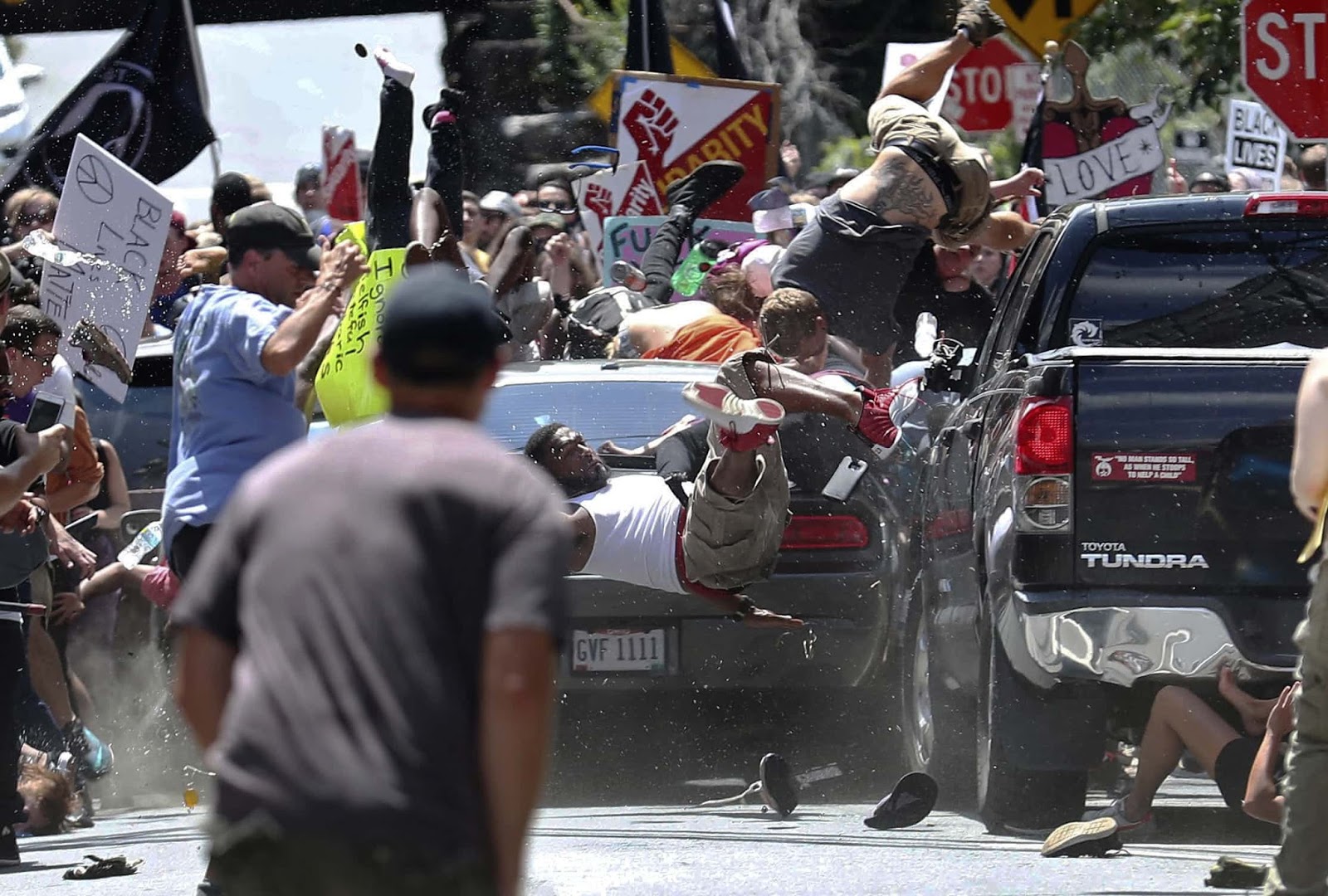
Ryan M Kelly/AP
12 August. I’m on staff with the local Charlottesville newspaper, so we had been planning for the day of the “Unite-the-Right” rally and its anti-far-right protesters. Early on, people were fighting. I had to wear a mask and goggles because there was pepper spray flying. It didn’t feel like we were in any imminent danger until I crossed the street and heard the screeching tyres come right past me. I pulled up my camera and just held down the shutter button. We knew pretty early on that at least one person had died and later heard it was civil rights activist Heather Heyer.
A tornado blows in Alberta, Canada

Cecilia Wessels
2 June. It was a hot afternoon, and my daughter woke from a nap saying, “Daddy doesn’t want to come inside – he’s mowing the lawn, but there’s something in the sky!” I asked my husband if he’d seen it and he said, “Yes, but everything’s fine; it’s moving away.” I took a picture of the tornado on its own to send to my parents. It was really big, so I included my husband for perspective. At the time, it didn’t feel dangerous at all – it was a strange moment.
Denver Broncos team take a knee

John Leyba/Denver Post/Getty Images
24 September. The Denver Broncos were playing the Buffalo Bills in upstate New York. I thought a low angle would be the best way to make it dramatic. Trump had been making statements about players taking a knee and I knew players were going to have some kind of protest, but I didn’t think so many were going to do it. It was overwhelming; when they took the knee, the crowd started booing. For the team, it was pretty sombre. I know they discussed it in a team meeting, but the crowd really jumped on them.
Riot police clash with protesters in Nairobi, Kenya

Ben Curtis/AP
10 August. I’d been covering the clashes between demonstrators and police in Kawangware slum in Nairobi that erupted following the election. The protesters were throwing rocks and the police were firing tear gas back at them. We were behind the police lines and they had just fired a few more tear gas grenades when I saw a man walk out from the crowd of protesters towards us. For most people, their eyes would be streaming and they sometimes have difficulty breathing, but he seemed completely unfazed – it was quite remarkable. When he reached the police line, a policeman hit him once with a truncheon, then they allowed him to continue.
Donald Trump waits to step out for his inauguration
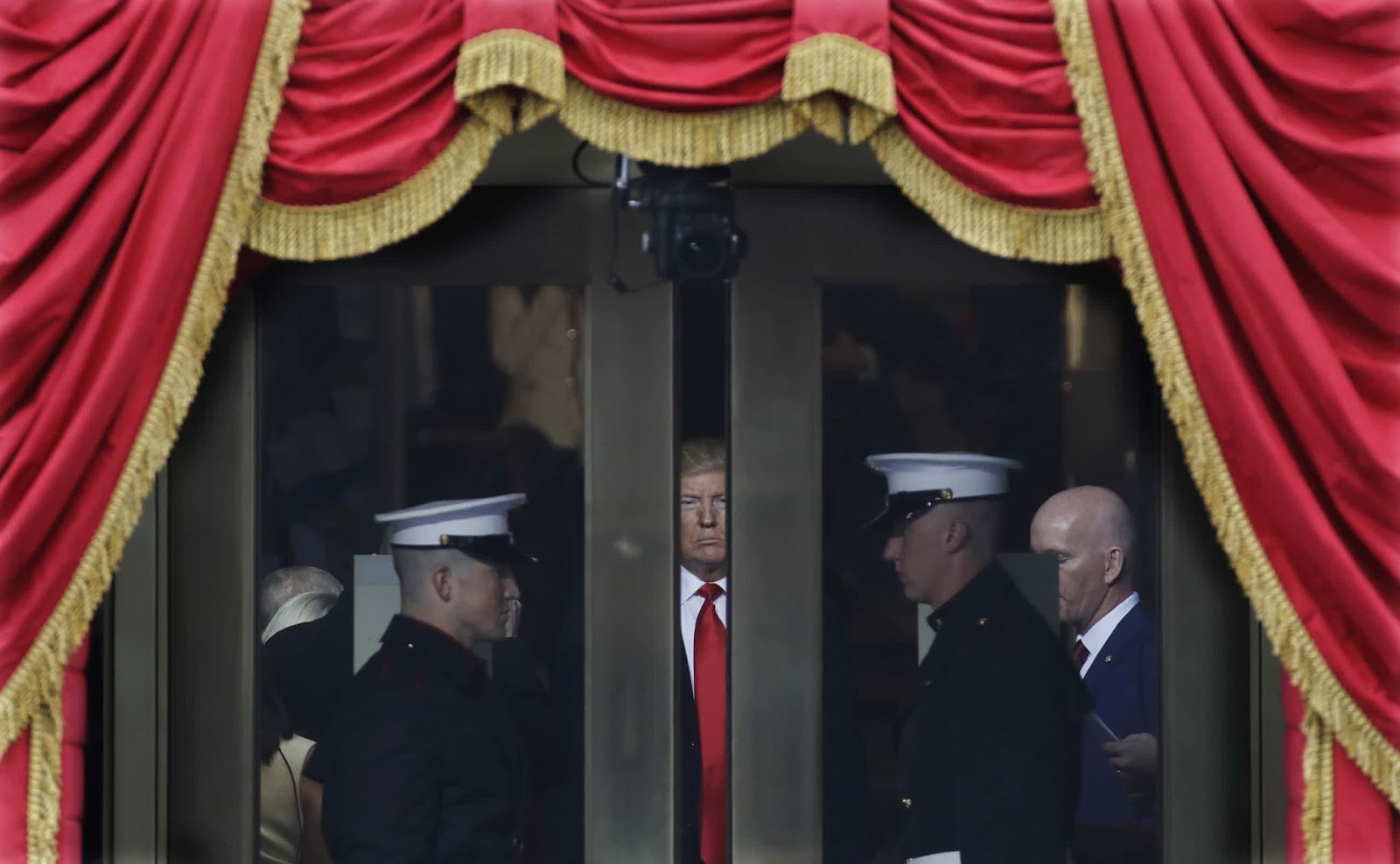
Patrick Semansky/AP
20 January. I was on a tower in the centre looking right at the podium. From there, I could see into the hallway where Trump was waiting. Mike Pence came out, then Trump moved into his spot, and just as the doors were closing I focused on him. There were two marines opening the doors, so at the first sign of movement I started to shoot. I was too nervous to check if Trump was in focus. When I looked through the images afterwards, you could see him close his eyes and take a breath – but I can’t say what was going through his head.
Kandy Freeman at a Black Lives Matter protest
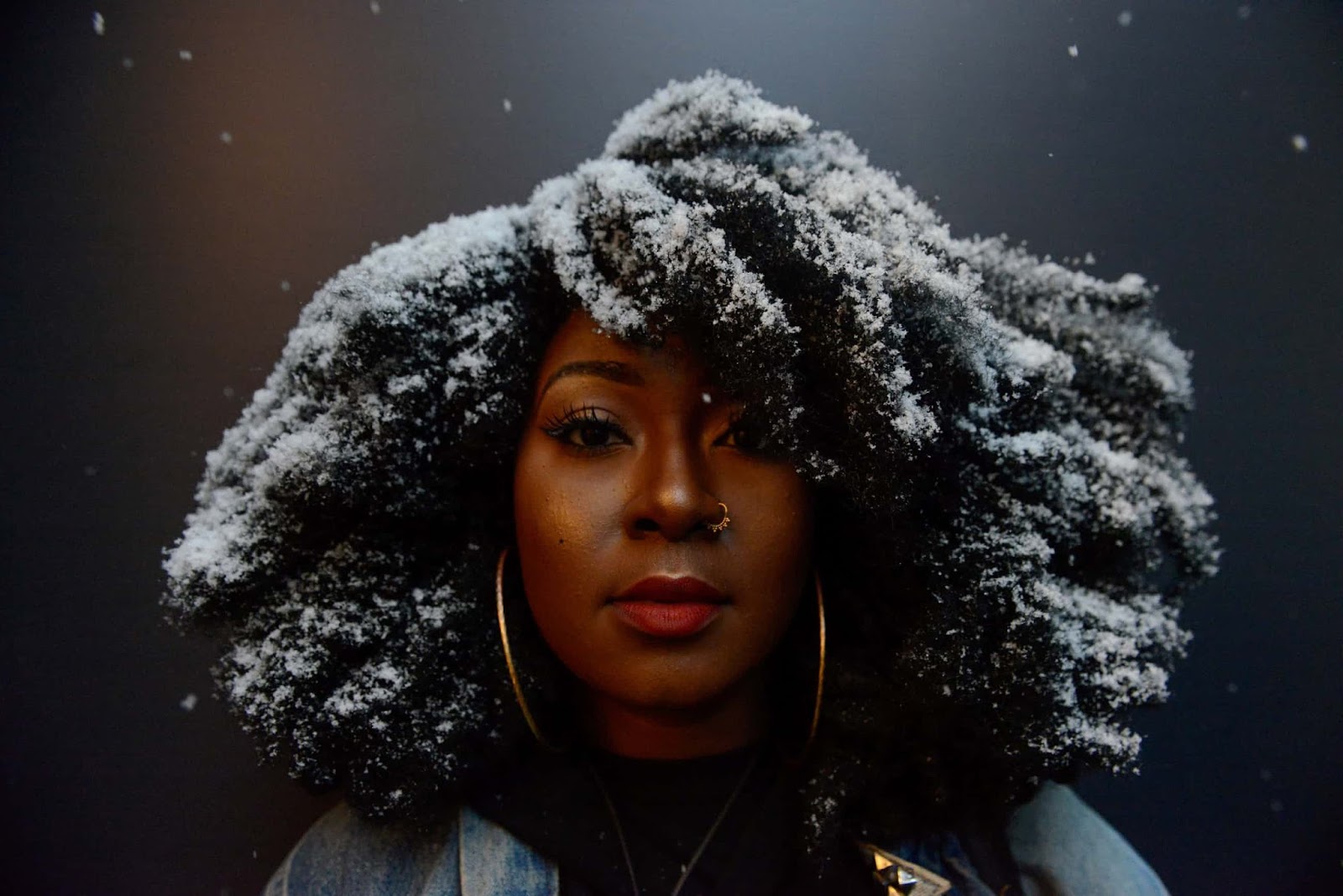
Stephanie Keith/Reuters
14 January. I had an assignment to stake out Trump Tower a couple of days before the inauguration. At around four o’clock, the march arrived across the street. It had just started snowing heavily – these big flakes. I went over and saw Kandy Freeman. I loved the way the snowflakes were staying in her afro. I thought that was a poignant detail, that they were not melting. They were the embodiment of “the snowflake”, the slur the right uses for the liberal left. The photo seems really quiet, but there’s actually chaos going on behind us.
A blaze engulfs Grenfell Tower in Notting Hill
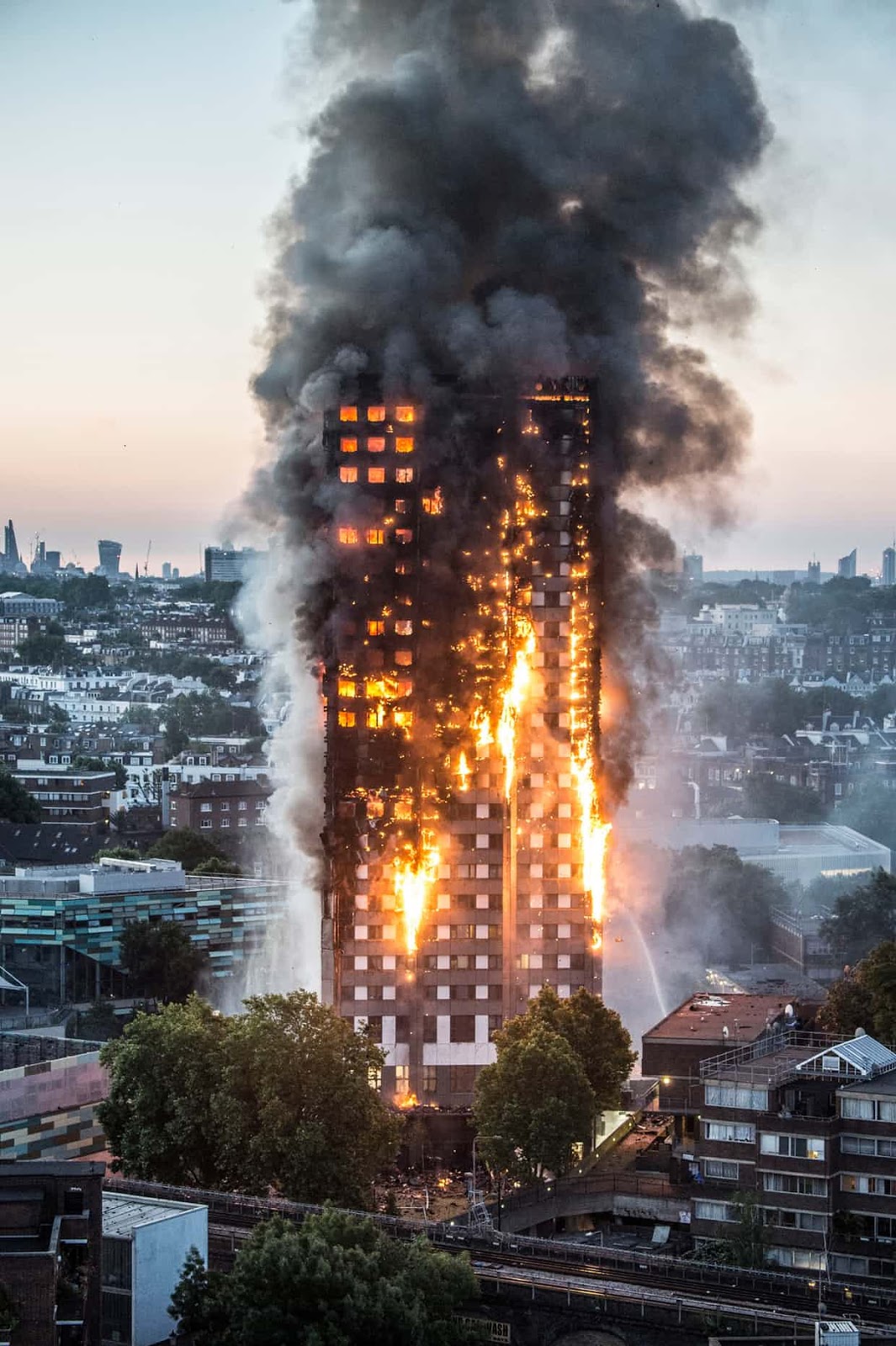
Jeremy Selwyn/Evening Standard/eyevine
14 June. I got a call at around 1.30am saying that there was a fire in west London. When I arrived it was a horrible, nightmare scene. About a third of the tower was alight. I got as close as I could. Rubble was falling and I could hear screams – I felt helpless; there was nothing I could do. I knew there was another block of flats nearby where I could go to take that photo – a gentleman let me on to his balcony. From there, you could see the whole of the building being engulfed. I’ve covered loads of tragedies over the years, but that ranks as one of the worst.
Rohingya refugees flee to Bangladesh
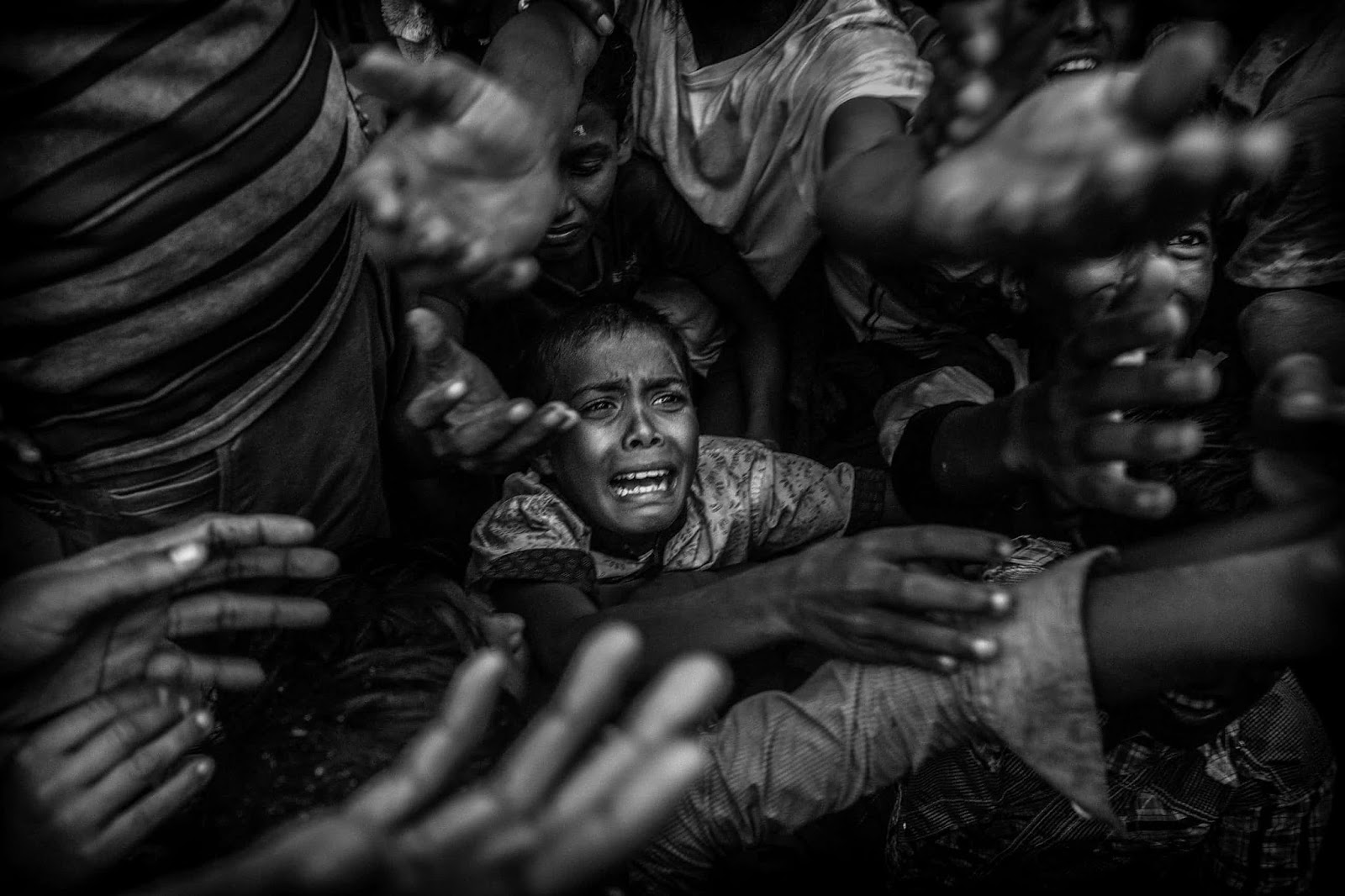
Kevin Frayer/Getty Images
18 September. This was taken on my first day at Cox’s Bazaar, where refugees were arriving in transition to the camps. I was driving near the border, and the streets were lined with people looking for aid. They started giving out white bags – I think they were full of food – but they were so limited that people were fighting for them. Children had been sitting on the ground, but they leaped up, and this boy fought his way through the crowd. I think his crying was a reaction to everything happening around him – the combination of it being hot, him being pushed and being desperate. I looked at the photographs afterwards, and I can’t tell if he ever got anything – he just disappeared into the chaos.
White supremacists’ torch march in Charlottesville

Samuel Corum/Anadolu Agency/Getty Images
11 August. I had heard rumors that there was going to be a torch march the night before the main Unite the Right rally in Charlottesville. Slowly, groups of people came, and pickup trucks started handing out torches. It was surreal. I expected to be hassled but I wasn’t. I was stunned that they were unafraid to show their faces. The guy in the white shirt, Peter Cvjetanovic, did an interview afterwards. He said he was not racist; it shouldn’t be taken out of context. But that was the context. They were chanting, “You will not replace us” – and he was shouting at the top of his lungs.
Protesters face off with police in North Dakota

Ryan Vizzions
1 February. I went to Standing Rock because I felt there wasn’t much mainstream coverage of the Dakota Access pipeline protests taking place there. I saw that photograph coming and I waited for about 15 minutes to get it. I try to mix fine art with photojournalism – I’m really into symmetry and perspective. I was behind the police, looking up at the Native Americans – I think 75 people ended up getting arrested. Since photographing the protests, I’ve kind of been adopted by the Lakota people – they’re like family to me. I hope to help amplify indigenous voices.
Swimmer at the Munsu water park in Pyongyang

Ed Jones/AFP
21 July. This is part of a series of portraits of North Koreans. This swimmer, Ri Song-hui, is in her early twenties. People can be incredibly shy because they might not have seen foreigners walking around before. But I showed her some other portraits I had done to help her understand the project and then she was fine. There is a demystifying element to these images, I hope, in that we can see they are normal people enjoying what many of us would do on a weekend.
Five orphan rhinos that have been dehorned

Natalie Rogers
8 November. I was working at the Rhino Revolution rehabilitation facility for orphaned rhinos. They come in around three months old, traumatised from having lost their mothers to poachers. They often stay with the carcass until they are rescued. We introduce them to other calves, and that becomes their company, so we can withdraw a little bit. Once they are large enough, we release them into a reserve – which happened a couple of days after I took this photograph. They are dehorned as a poaching deterrent. They are anaesthetised, and as much as possible is removed, down to the base. The blue you can see is an antiseptic spray.
Fire brigade recruits at a training exercise
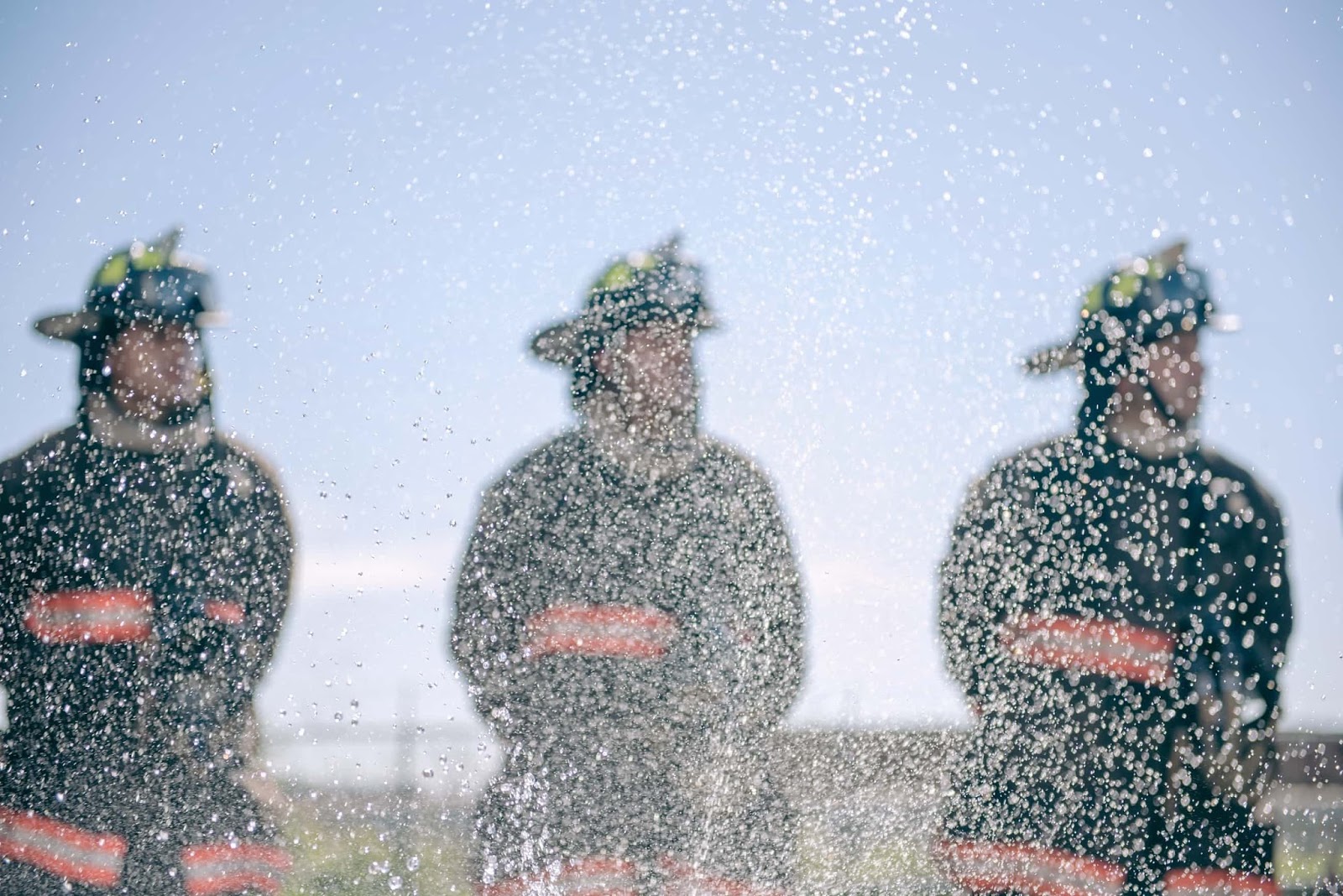
Rosa Furneaux
19 May. We had a devastating fire in a warehouse in Oakland last year, known as the Ghost Ship fire. Afterwards, I became interested in the Oakland fire department, which responded. I asked if I could document the first recruit class after the Ghost Ship fire. This photograph was one of the first shots I took. I think the water is coming out of a hosepipe that hasn’t been correctly attached, because they were still getting used to the equipment. I was looking at the way in which the newcomers could be affected by what happened, but also their enthusiasm for the job and dedication. All of them graduated.
A homemade octopus lure is lowered to the seabed

Tommy Trenchard/Panos Pictures
25 August. My wife and I were photographing the Bajau sea nomads, who have spent most of the last few hundred years living aboard boats [on a stretch of ocean between the Philippines, Malaysia and Indonesia]. This man is dropping a homemade octopus lure down to the seabed. Octopus is one of the main species they hunt. The Bajau are famous for their freediving – they can hold their breath for about five minutes underwater. One of the biggest challenges we faced was that the only scuba school in the region had run out of oxygen. I had to learn a few freediving techniques to take this photograph: I dived down and frantically shot a few frames before my air ran out.
Women’s March on Washington

Mario Tama/Getty Images
21 January. I used to live and work in Washington and, as a photographer, you always keep a bank of old vistas in the back of your mind, so I knew this was a good spot. The march felt massive – especially compared to the inauguration the day before. I wanted to try to show the number of people there and the content of the signs – some were funny, some serious, but they were all really creative. If you look closely, you can see quite a lot of the detail – the thoughts of the protesters – I think that’s why this image resonates.
Fulani youths take part in a male beauty contest
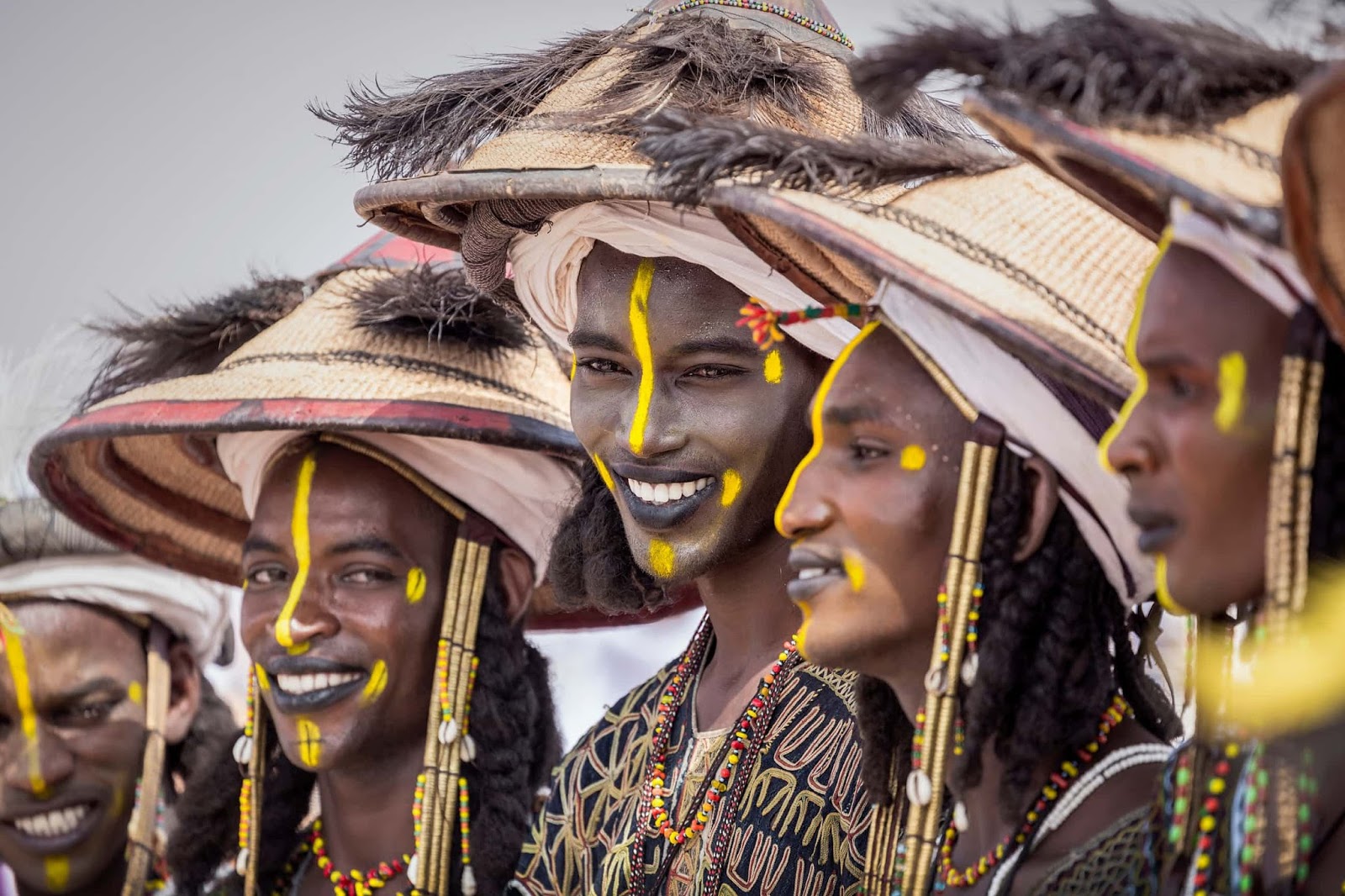
Sven Torfinn/Panos Pictures
16 September. I was in Niger while the Cure Salée festival was taking place. Thousands of people come to celebrate the end of the rainy season. It is also an important meeting point. This photograph is of young Fulani men taking part in a ceremony to attract the attention of potential girlfriends and wives. If you look at this picture you might think it’s very traditional, not developed – but it is; it’s a bit like music festivals in Europe. These men do their dances, which are centuries old, but then they take out their mobile phones or jump on their scooters.
Anti-government protesters in Caracas, Venezuela

Ariana Cubillos/AP
10 May. This is a moment of demonstration during the political crisis in Caracas. For 120 days, people were protesting the shortage of food, the inflation, and calling for President Nicolás Maduro to leave. The protesters in the picture were using a huge catapult to throw bottles filled with paint and stones. All this was happening in the middle of a confrontation with the National Guard soldiers. I’ve never seen anything like it. The soldiers were launching tear gas canisters and rubber bullets. There was so much going on in that moment – I only had a second to take the picture.
Guadalupe Plaza, Houston, US

Alex Webb/Magnum Photos
15 June. I heard there was going to be a protest against potential changes in immigration policy, taking place on the east side of Houston. I photographed the demonstration, but then I saw this group of kids hanging out in the park. I realized one of them was about to jump – and fortunately, I already had the camera to my eye as he spun upside-down. The boy who doesn’t have a foot was extremely shy, but one of his friends said he lost it playing in the train yard. The picture evokes some complicated emotions – there’s something a little surreal about it.
A Ukrainian serviceman exercises with weights made from mortars
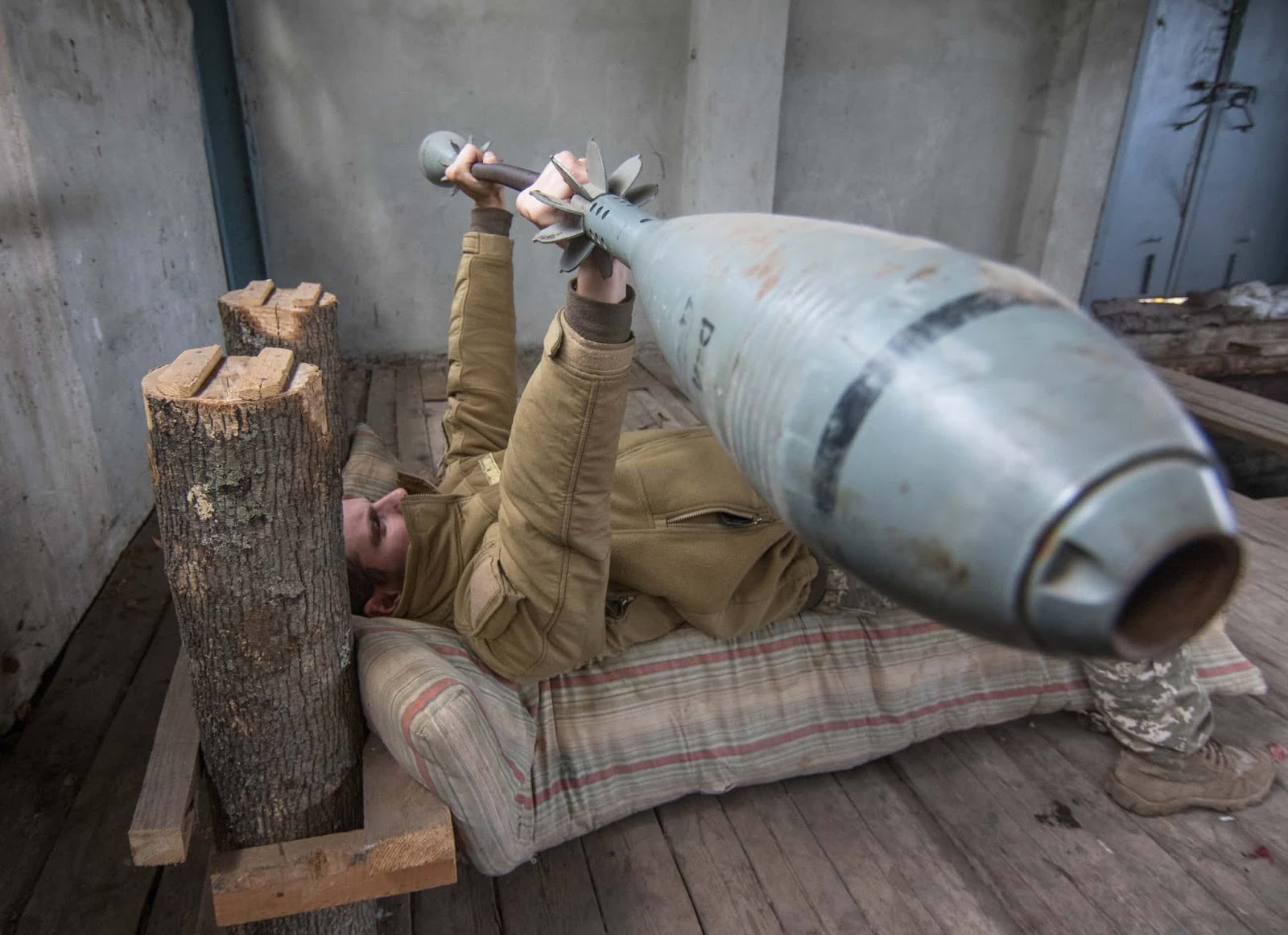
Sergey Vaganov/EPA
16 October. I took this photograph at a Ukrainian army position. He’s an officer doing exercises using 120mm mortar shells; there’s lots of this kind of improvised gym at the front. I lived in Donetsk until the war started. One day pro-Russian separatists detained me and said they would pay me to work for their media channel. They said if I refused, I’d be forced to dig trenches without payment. I fled to Mariupol [controlled by the Ukrainian government] and I’ve lived there since. Almost every week I go to the frontline. I used to work on a local newspaper in Donetsk – I never expected to become a war photographer.
Beyoncé

Awol Erizku/The Carters/Instagram
1 February. A picture of Beyoncé pregnant with twins captured by the artist Awol Erizku and shared by Beyoncé and Jay Z on Instagram.
Source: The Guardian















COMMENTS